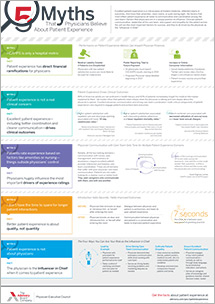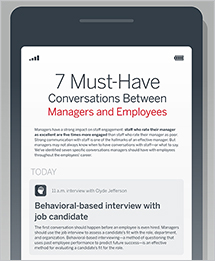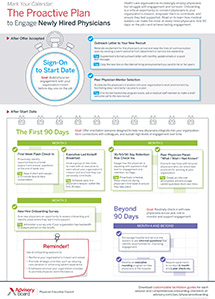Auto logout in seconds.
Continue Logout"Being a good doctor is a lot like being a good mentor," physicians Sanjay Saint, professor of internal medicine at the University of Michigan, and Vineet Chopra, associate professor of medicine and chief of the division of hospital medicine at Michigan Medicine, write for Harvard Business Review.
In both roles, they explain "the relationship is asymmetric: the doctor holds the power or authority, and has most of the expertise," and has an ethical duty to act in the best interest of the patient or mentee.
4 'guiding principles' to being a better doctor, mentor
Over the years, Saint and Chopra write they've found the best doctors and mentees are able to incorporate "mindfulness" into their practices. They've identified four "guiding principles" that doctors can follow to become more mindful and better mentors.
- Be available and fully present
Between appointments with patients, meetings, and conferences, it can be difficult for physicians to find time to give their mentee the attention they need. That's why, Saint and Chopra write you need to make the most of the time you have.
Instead of cancelling a meeting with a mentee, Saint and Chopra recommend planning shorter meetings. "There is great utility in a 30-minute—even 15-minute—meeting if a traditional 60-minute mentoring meeting isn't possible," Saint and Chopra write. In fact, "shorter meetings, will force," doctors and their "mentee[s] to get to the point."
For physicians who spend a lot of time on the road, you can meet with your mentee virtually via text, phone calls, and emails, Saint and Chopra write.
Regardless of the meeting format, mentors should be "mindful" and present during the time they spend with mentees. "Being a mindful mentor means demonstrating to your mentee that for the next X minutes, they are all that matters," Saint and Chopra write.
- Define your role as a mentor
A mentor can take on a few different "key" roles, and it's important for physicians to figure out which one they fill, Saint and Chopra write. Those roles include: a coach, a sponsor, or a connector to their mentee, Saint and Chopra explain.
A coach advises the mentee on "how to improve in a particular skill, such as finding a job or performing a particular medical procedure;" a "sponsor" promotes their mentee for "high-profile positions" or awards; and a connector links mentees with other "mentors, coaches, and sponsors," Saint and Chopra explain.
According to Saint and Chopra, the best mentors know what role they play and play it well by "anticipat[ing] what the mentee needs even before [he or she] is aware of such a need."
- Remain objective and support your mentee
It's important for mentors to remain supportive and to distance themselves from negative thoughts and assumptions, even in moments where the mentee lets you down. Saint and Chopra said they've "both been disappointed by mentees who show up late for meetings; annoyed by those who over promise but under-deliver; and even sad when mentees have told us that they were hoping for a different mentor or experience."
But "[j]ust as clinicians work to prevent emotions in the moment from getting in the way of patient care, mindful mentors resist allowing emotions to influence their real-time interactions with mentees," Saint and Chopra advise.
In their experience, Saint and Chopra have found that mentees who disappoint usually have a valid excuse. "[O]ften a mentee is late for a good reason, one they can't control–like staying to hold a family meeting or to be at a dying patient's bedside," they write, which is why "mindfully withholding immediately judgement and emotions is best for all involved."
- Put yourself in the mentee's shoes
"Before meetings with mentees (especially ones where difficult feedback or conversations may happen), we consciously try to put ourselves in their shoes before and during the conversation," Saint and Chopra write.
Gaining perspective into the lives of the mentees can help physicians navigate potentially difficult or uncomfortable conversations and can soften their outlook on their mentee's performance. "[T]he realization that most of us are doing the best we can given the circumstances reminds us that criticism without kindness can seem cruel to the recipient," Saint and Chopra write. Developing this level of insight and understanding "takes time, patience … perseverance, [and] … practice," the authors acknowledge. That said, they conclude, "[Y]our patients would expect nothing else. So why should your mentees?" (Saint/Chopra, Harvard Business Review, 10/4).
The proactive plan to engage newly hired physicians
Download this infographic to learn how to drive engagement across physicians’ first 90 days at your organization and beyond.
Don't miss out on the latest Advisory Board insights
Create your free account to access 1 resource, including the latest research and webinars.
Want access without creating an account?
You have 1 free members-only resource remaining this month.
1 free members-only resources remaining
1 free members-only resources remaining
You've reached your limit of free insights
Become a member to access all of Advisory Board's resources, events, and experts
Never miss out on the latest innovative health care content tailored to you.
Benefits include:
You've reached your limit of free insights
Become a member to access all of Advisory Board's resources, events, and experts
Never miss out on the latest innovative health care content tailored to you.
Benefits include:
This content is available through your Curated Research partnership with Advisory Board. Click on ‘view this resource’ to read the full piece
Email ask@advisory.com to learn more
Click on ‘Become a Member’ to learn about the benefits of a Full-Access partnership with Advisory Board
Never miss out on the latest innovative health care content tailored to you.
Benefits Include:
This is for members only. Learn more.
Click on ‘Become a Member’ to learn about the benefits of a Full-Access partnership with Advisory Board
Never miss out on the latest innovative health care content tailored to you.



